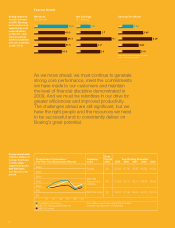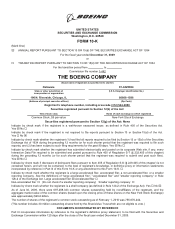Boeing 2009 Annual Report Download - page 19
Download and view the complete annual report
Please find page 19 of the 2009 Boeing annual report below. You can navigate through the pages in the report by either clicking on the pages listed below, or by using the keyword search tool below to find specific information within the annual report.Our commercial aircraft customers may request to cancel, modify or reschedule orders. We
generally make sales under aircraft purchase agreements that may, for a variety of reasons, become
the subject of cancellation, modification or rescheduling. Changes in the economic environment and
the financial condition of the airline industry and our customers could result in customer requests to
reschedule or cancel contractual orders. Our contracts have specific provisions relating to schedule
and performance and failure to deliver airplanes in accordance with such provisions could result in
cancellations and/or claims for compensation. Any such cancellations, modification, rescheduling or
claims could significantly reduce our backlog, revenues, profitability and cash flows.
Our commercial aircraft production rates could change. Production rate reductions could cause us to
incur disruption and other costs and result in infrastructure costs being allocated to a smaller quantity
of airplanes, all of which could reduce our profitability. The introduction of new aircraft program and/
or higher orders for our aircraft could lead to production rate increases in order to meet the delivery
schedules. Failure to successfully implement any production rate changes could lead to extended
delivery commitments, and depending on the length of delay in meeting delivery commitments,
additional costs and customers rescheduling their deliveries or terminating their related contract with
us.
We depend heavily on U.S. government contracts, which are subject to unique risks.
In 2009, 43% of our revenues were derived from U.S. government contracts. In addition to normal
business risks, our contracts with the U.S. government are subject to unique risks, some of which are
beyond our control.
The funding of U.S. government programs is subject to congressional appropriations. Many of the
U.S. government programs in which we participate may last several years; however, these programs
are normally funded annually. Changes in military strategy and priorities may affect our future
procurement opportunities and existing programs. Long-term government contracts and related
orders are subject to cancellation, or delay, if appropriations for subsequent performance periods are
not made. In addition, the U.S. DoD budget is under pressure due to competing national priorities.
The termination or reduction of funding for existing or new U.S. government programs could result in
a material adverse effect on our earnings, cash flow and financial position.
The U.S. government may modify, curtail or terminate our contracts. The U.S. government may
modify, curtail or terminate its contracts and subcontracts with us, without prior notice and at its
convenience upon payment for work done and commitments made at the time of termination.
Modification, curtailment or termination of one or more of our major programs or contracts could
have a material adverse effect on our results of operations and financial condition.
Our contract costs are subject to audits by U.S. government agencies. U.S. government
representatives may audit the costs we incur on our U.S. government contracts, including allocated
indirect costs. Such audits could result in adjustments to our contract costs. Any costs found to be
improperly allocated to a specific contract will not be reimbursed, and such costs already reimbursed
must be refunded. We have recorded contract revenues based upon costs we expect to realize upon
final audit. However, we do not know the outcome of any future audits and adjustments and we may
be required to reduce our revenues or profits upon completion and final negotiation of audits. If any
audit uncovers improper or illegal activities, we may be subject to civil and criminal penalties and
administrative sanctions, including termination of contracts, forfeiture of profits, suspension of
payments, fines and suspension or prohibition from doing business with the U.S. government.
Our business is subject to potential U.S. government inquiries and investigations. We are sometimes
subject to certain U.S. government inquiries and investigations of our business practices due to our
participation in government contracts. Any such inquiry or investigation could potentially result in a
material adverse effect on our results of operations and financial condition.
7
























